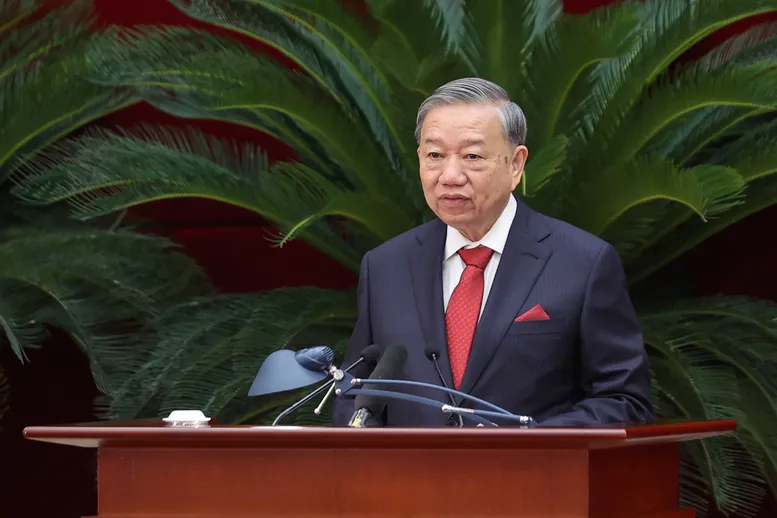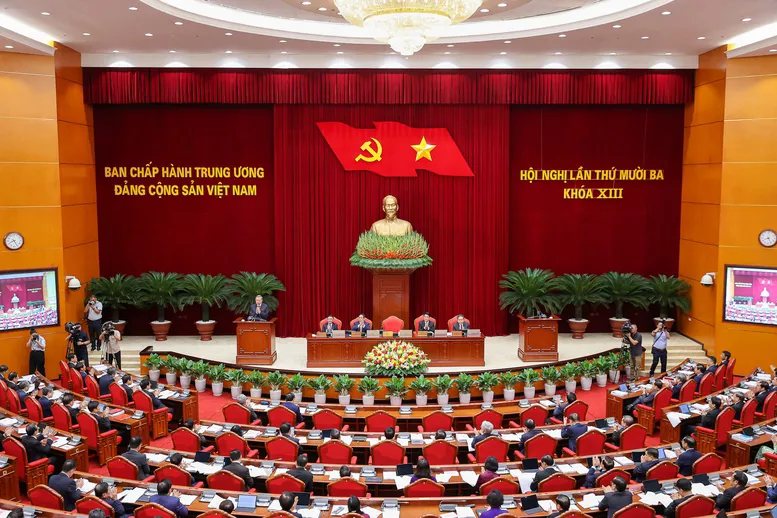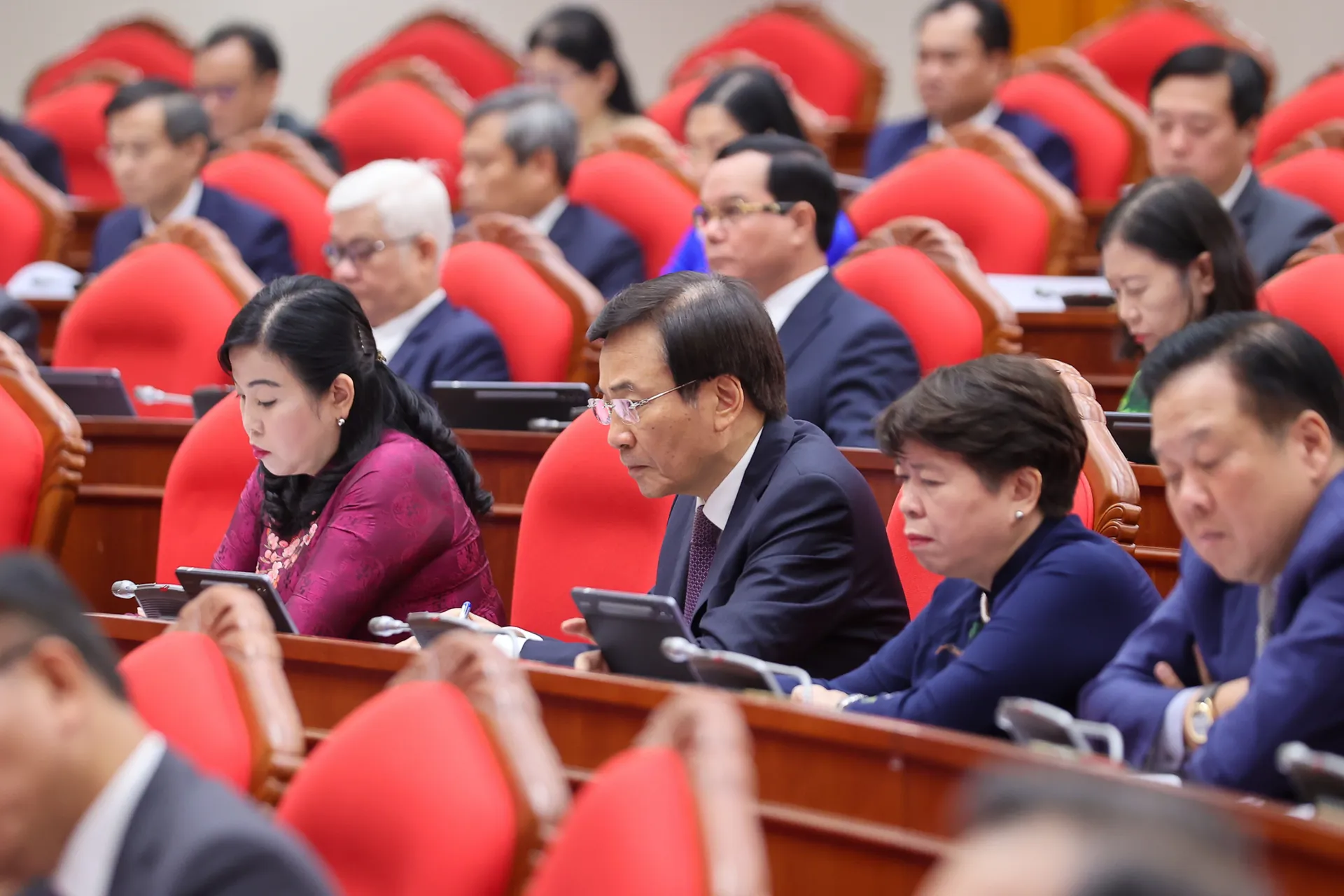Macroeconomic stability – the request for Vietnam’s 10% GDP growth
The Communist Party of Vietnam’s 13th Central Committee is holding its 13th plenum in Hanoi, where leaders focus on economic resilience, new growth drivers, digital transformation and preparations for the 14th National Congress.
The 13th plenum of the 13th Central Committee of the Communist Party of Vietnam (CPV) opened in Hanoi, with maintaining macroeconomic stability to boost market confidence set as a key goal.

General Secretary To Lam of the Communist Party of Vietnam speaks at the 13th Party Central Committee's 13th Plenum held in Hanoi on October 6. Photos: Nhat Bac/VGP
Party General Secretary To Lam said Vietnam must keep fiscal and monetary policies flexible and well-coordinated to ensure sustainable development, aiming to achieve more than 10% GDP growth in the next tenure starting in 2026.
The four-day plenum, from October 5 to 8, will focus on six key priorities, including reinforcing market confidence, promoting investment, consumption and exports, and expanding growth space through regional connectivity and urbanization.
Delegates are also discussing accelerating digital and green transformation, turning data into a resource and the digital economy into a growth engine, and raising productivity and standards through science, technology and innovation.
Other focal points include promoting the three growth drivers, namely investment, consumption and exports, while unlocking new growth space through regional connectivity and high-quality urbanization.
It also requires accelerating digital and green transformation, turning data into a resource and the digital economy into a growth engine, in addition to enhancing productivity, quality and standards through science, technology and innovation.
Another issue of discussions includes developing transparent and efficient markets for capital, labor, science–technology and real estate while implementing 11 strategic technologies outlined in Resolution 57 to strengthen national scientific and technological autonomy.
In his speech, the Party chief highlighted that 2026, the first year of the new term, will be pivotal for implementing the 14th National Party Congress’s Resolution. Vietnam’s targets are highly ambitious, with GDP growth above 10%, per capita income reaching US$5,400–US$5,500 and CPI increasing by around 4.5%.
He said that the targets are both mandatory and challenging, requiring strong policy coordination to ensure economic independence and resilience. The overall approach must reflect the motto: “Stability, discipline, acceleration, breakthrough and sustainability.”

Overview of the meeting today.
Reports presented at the conference highlighted Vietnam’s economy remained resilient despite global uncertainties, with Q3 GDP up 8.22% and nine-month growth at 7.84%.
Budget revenue reached nearly VND2 quadrillion (US$79 billion), equivalent to 97.9% of the annual estimate, while trade surplus approached $17 billion.
All 15 major socio-economic targets are expected to be met or exceeded, with full-year GDP growth projected between 8.1% and 8.5%.
Decisive factors for selecting high-profile officials
Beyond the economy, the plenum also discussed key preparations for the 14th National Party Congress, including personnel planning and the drafting of major political documents.

Delegates at the plenum.
Regarding personnel for the 14th-tenure leadership, Lam said that virtue, competence and integrity will be decisive in selecting high-level officials, warning that opportunists or power-seekers “must never be allowed” into the Central Committee.
He called on personnel selection the “core of the core,” stressing that candidates must put national and Party interests first while ensuring balance between standards and structure, continuity and innovation and virtue and talent.
The 14th National Congress documents include 17 major updates, including a new growth model driven by science, technology, innovation and digital transformation.
The event took place amid renewed national confidence following the 80th anniversary of the August Revolution (August 19) and National Day (September 2). Socio-economic indicators improved across sectors compared to 2024, the two-tier local governance model operated smoothly, while public services became more citizen- and business-oriented.
Regional and spatial planning has become more interconnected, unlocking new competitive advantages. Seven strategic Politburo resolutions adopted over the past year have paved the way for steady progress toward the Party’s dual centenary goals, which focus on peace, stability, rapid and sustainable growth to improve living standards.
“Our Party has firmly steered the ship through turbulent waters, resolutely moving forward to achieve the goals set by the 13th National Party Congress and other strategic resolutions,” General Secretary To Lam affirmed.
|
The Politburo has issued seven strategic resolutions since 2024, including: Resolution No. 57-NQ/TW dated December 22, 2024, on breakthroughs in science, technology, innovation and national digital transformation; Resolution No. 59-NQ/TW dated January 24, 2025, on international integration in the new context; Resolution No. 66-NQ/TW on renewing the formulation and enforcement of laws to meet national development requirements in the new era; Resolution No. 68-NQ/TW dated May 4, 2025, on developing the private sector; Resolution No. 70-NQ/TW dated August 20, 2025, on ensuring national energy security through 2030, with a vision toward 2045; Resolution No. 71-NQ/TW dated August 22, 2025, on breakthroughs in education and training development; Resolution No. 72-NQ/TW dated September 9, 2025, on key solutions to strengthen the protection, care and improvement of public health. |








